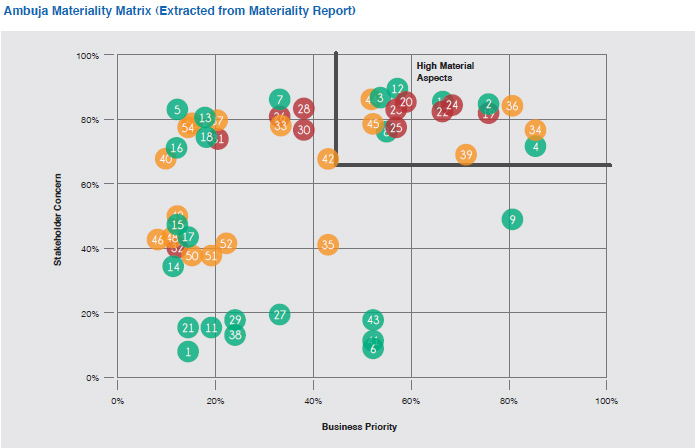

 |
 |
 |
 |
 |
 |
 |
 |
 |
 |
 |
 |
 |
 |
 |
 |
 |
 |
 |
 |
 |
|
Report Content and Boundary
Preparation of the Report has been an in-house effort led by the Corporate Environment & Sustainability team, with responses collected and considered from the various departments/functions. This Report, including all its content, is an outcome of the combined efforts of all respondents. While we have taken due care to prepare a comprehensive, transparent, and accurate Sustainability Report, we acknowledge that we might have missed certain topics that are of relevance to our esteemed stakeholders. We welcome feedback and suggestions on such topics. This Sustainability Report includes all Ambuja operations & businesses that fall in the direct control of the Company. All operations of Ambuja (not other subsidiaries/enties) within India are covered, including manufacturing plants with mines, bulk cement terminals (offshore activities), Corporate Office & Marketing Offices. The Company uses dry cement manufacturing process technology in five integrated cement plants, eight grinding plants, 10 mines, and five ports. The aspect boundaries and content have been defined using reporting principles prescribed in the GRI G4 guidelines. The Report excludes subsidiaries, JVs, The stakeholder engagement programme was deployed in phases, focusing on each identified stakeholder sector individually. Gap analysis was carried out to revise the |
Material Aspects
Ambuja launched a comprehensive stakeholder engagement programme to facilitate good understanding of the Company’s obligations to its stakeholders, consistent with its commitment to corporate responsibility, for the preparation of the GRI G4 Report. It now has a platform for transparent communication and can identify and address stakeholder interests. This is premised on the principle of ethical accountability; groups that can affect or be affected by the operational footprint of the business should be involved in decisions that may directly or indirectly affect them. GRI G4 guideline on the stakeholder engagement, G4: 24-27, was followed; the objective was issue-based, proactive and learning-oriented implementation. This helped achieve tangible results in alignment with the Company’s targets. It was based on a well-defined closed loop approach that included engagement strategy development, stakeholder mapping, prioritisation, preparation, implementation and an action plan whose results were fed into a feedback loop. In agreement with the Ambuja Cements Limited group values, the principles of completeness, responsiveness, transparency, collaboration, inclusiveness, and integrity were adhered to engagement strategy continuously and include the emerging materiality issues into the business sustainability agenda. |

|
 |
 |